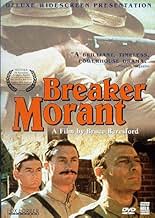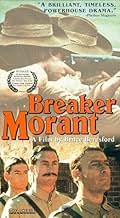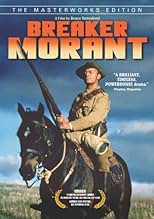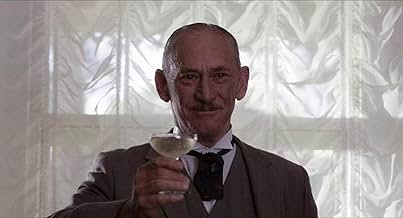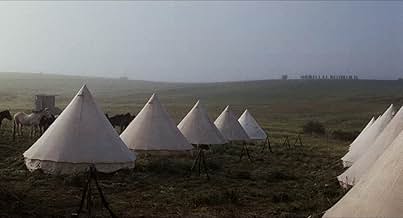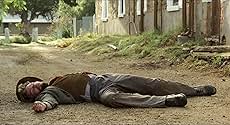NOTE IMDb
7,8/10
15 k
MA NOTE
Trois lieutenants australiens sont traduits en cour martiale pour avoir exécuté des prisonniers afin de détourner l'attention des crimes de guerre commis par leurs supérieurs.Trois lieutenants australiens sont traduits en cour martiale pour avoir exécuté des prisonniers afin de détourner l'attention des crimes de guerre commis par leurs supérieurs.Trois lieutenants australiens sont traduits en cour martiale pour avoir exécuté des prisonniers afin de détourner l'attention des crimes de guerre commis par leurs supérieurs.
- Réalisation
- Scénario
- Casting principal
- Nommé pour 1 Oscar
- 13 victoires et 8 nominations au total
Charles 'Bud' Tingwell
- Lt. Col. Denny
- (as Charles Tingwell)
Avis à la une
We don't see very many films or dramas on the history channel here in Britain . I know the American version shows them because American reviewers have mentioned this on this very website , but I'm not very keen on this happening over here because before you know it we might be seeing THE GREEN BERETS , BRAVEHEART and WE WERE SOLDIERS appearing on the channel , poor movies and poor history to boot in my opinion . At the weekend we were treated to BREAKER MORANT . As I said I'm not keen on the history channel transmitting feature films but I'll forgive them this time because it's a very good movie and very good history .
BREAKER MORANT is the dramatisation of a real life incident during the Boer war , the first " dirty war " of the 20th century , where three Australian officers Harry Morant , John Handcock and George Witton are on trial for their lives for the murder of boer POWs and of a German missionary . What I love about this film is that unlike a lot of other movies with an anti-war / anti- military injustice agenda is that it shows the difficult situations soldiers will always find themselves in . The men on trial are victims , victims of politics and of a wider picture . With the killing of the missionary Germany wants to intervene in the conflict on the side of the boers , not to protect the noble South African farmers from British aggression but to get their hands on the region's gold and diamond mines . In order to stop this happening the British government needs scapegoats in order to hang and Morant , Witton and Handcock were to be hung out to dry so it's the politicians of the time who are to blame for this miscarriage of justice , not the military , and it'd be interesting to note what people who campaign for pardons for the British soldiers shot for " cowardice " during the first world war make of this tale . The three characters on trial here are victims of a grave injustice but you can't help feeling because they " were only obeying orders " sympathy for them will be in short supply from a modern day perspective . I'm probably correct in saying that anyone who's served in the military can see far more clearly the injustice done than any of the " professional anti-war brigade " . BREAKER MORANT isn't a movie than can be used for anyone's hidden agenda , and for that we should be grateful
It's fairly obvious BREAKER MORANT is based upon a stage play . The central setting is a military court room with much of the story told in flashback . Director Bruce Beresford handles the action scenes very well but in this type of story the most important aspect is the cast and their acting , and the director gets the best out of his cast especially Edward Woodward ( Normally an actor I don't like ) who gives a career best performance and Jack Thompson . My only criticism of the casting is that a couple of actors playing British characters let their Aussie accents slip a little , but I'm nitpicking .
Just to sum up this is a very intelligent story of a dirty war , dirty politics and dirty justice which will appeal to serious historians and former servicemen rather than professional pacifists
BREAKER MORANT is the dramatisation of a real life incident during the Boer war , the first " dirty war " of the 20th century , where three Australian officers Harry Morant , John Handcock and George Witton are on trial for their lives for the murder of boer POWs and of a German missionary . What I love about this film is that unlike a lot of other movies with an anti-war / anti- military injustice agenda is that it shows the difficult situations soldiers will always find themselves in . The men on trial are victims , victims of politics and of a wider picture . With the killing of the missionary Germany wants to intervene in the conflict on the side of the boers , not to protect the noble South African farmers from British aggression but to get their hands on the region's gold and diamond mines . In order to stop this happening the British government needs scapegoats in order to hang and Morant , Witton and Handcock were to be hung out to dry so it's the politicians of the time who are to blame for this miscarriage of justice , not the military , and it'd be interesting to note what people who campaign for pardons for the British soldiers shot for " cowardice " during the first world war make of this tale . The three characters on trial here are victims of a grave injustice but you can't help feeling because they " were only obeying orders " sympathy for them will be in short supply from a modern day perspective . I'm probably correct in saying that anyone who's served in the military can see far more clearly the injustice done than any of the " professional anti-war brigade " . BREAKER MORANT isn't a movie than can be used for anyone's hidden agenda , and for that we should be grateful
It's fairly obvious BREAKER MORANT is based upon a stage play . The central setting is a military court room with much of the story told in flashback . Director Bruce Beresford handles the action scenes very well but in this type of story the most important aspect is the cast and their acting , and the director gets the best out of his cast especially Edward Woodward ( Normally an actor I don't like ) who gives a career best performance and Jack Thompson . My only criticism of the casting is that a couple of actors playing British characters let their Aussie accents slip a little , but I'm nitpicking .
Just to sum up this is a very intelligent story of a dirty war , dirty politics and dirty justice which will appeal to serious historians and former servicemen rather than professional pacifists
This movie shows what a truly hellish thing war can be. Where no rule but rule `3-0-3' exists. A lot of films show war in one slant or another, glorious or horrific. This one just shows it for what it is. A damned horrible mess. Many of the actors are some of Australia's finest and this movie is a credit to their skill and talent. It has simple production values but it is elevated by their acting abilities and the great script. A definite must for those who favor the war genre in films, and a measuring point for those who seek to make a film about war and the people caught up in it.
Edward Woodward, better known to American audiences as the Equalizer, plays the title role in this military courtroom drama set during the Boer War. Woodward who had a well known reputation as a rollicking writer of the Australian frontier was one of three men charged with murdering several prisoners during the Boer War, one of them happened to be a German missionary. That got Kaiser Wilhelm's back up and the British were not looking for intervention from him on the Boer side. One must remember that the Germans did have a presence in Africa at the time. The diplomatic situation was not unlike the Korean War before the Chinese intervened.
What to do, but find someone to take the fall. Certainly not Lord Kitchener the commander of British forces in South Africa who let it be known quite unofficially and not on paper for attribution that he really wouldn't care if Boer Prisoners were shot. Edward Woodward, Bryan Brown and young Lewis Fitzgerald, get selected for a court martial. This is not unlike the more famous incident in the French Army during World War I as depicted in Paths of Glory.
The Australians to this day feel that these men were singled out because they were Australians and not British. Wouldn't do to have His Majesty's subjects, let alone the commander be held responsible. While the Boer War was going on, the various colonies on the Australian continent coalesced and formed a nation. Why the Australian government didn't protest more vigorously is something I'm not quite understanding.
That however does not detract from Breaker Morant being the fine film it is with sterling performances all around. Jack Thompson is the defense attorney in this court martial and does a splendid job in the face of a stacked deck.
Alan Cassell is a bloodless Kitchener covering his own rear at all costs and Vincent Ball plays Sir Ian Hamilton who was Kitchener's aide at the time. Australia would meet these two later on under far worse circumstances as Kitchener was War Minister in the Asquith cabinet during World War I and Ian Hamilton was the commander-in-chief of the Gallipoli Expedition where so many ANZACS died in another foreign battlefield for another cause not really their concern. Hamilton is shown as quite the rat here, helping to cover his boss's complicity.
I recommend Breaker Morant mostly for those who are not Australian so they can acquaint themselves with a sad and bitter chapter in that nation's life.
What to do, but find someone to take the fall. Certainly not Lord Kitchener the commander of British forces in South Africa who let it be known quite unofficially and not on paper for attribution that he really wouldn't care if Boer Prisoners were shot. Edward Woodward, Bryan Brown and young Lewis Fitzgerald, get selected for a court martial. This is not unlike the more famous incident in the French Army during World War I as depicted in Paths of Glory.
The Australians to this day feel that these men were singled out because they were Australians and not British. Wouldn't do to have His Majesty's subjects, let alone the commander be held responsible. While the Boer War was going on, the various colonies on the Australian continent coalesced and formed a nation. Why the Australian government didn't protest more vigorously is something I'm not quite understanding.
That however does not detract from Breaker Morant being the fine film it is with sterling performances all around. Jack Thompson is the defense attorney in this court martial and does a splendid job in the face of a stacked deck.
Alan Cassell is a bloodless Kitchener covering his own rear at all costs and Vincent Ball plays Sir Ian Hamilton who was Kitchener's aide at the time. Australia would meet these two later on under far worse circumstances as Kitchener was War Minister in the Asquith cabinet during World War I and Ian Hamilton was the commander-in-chief of the Gallipoli Expedition where so many ANZACS died in another foreign battlefield for another cause not really their concern. Hamilton is shown as quite the rat here, helping to cover his boss's complicity.
I recommend Breaker Morant mostly for those who are not Australian so they can acquaint themselves with a sad and bitter chapter in that nation's life.
After first encountering "Breaker" Morant during a bout of insomnia in 1984 on cable, I have repeatedly come back to this film as one of my all-time classics--covering war, politics, tactics, transitions to manhood involved in all wars--and injustice.
Although set during the Boer War, the account of three officers tried for murder during a war in which the opponents were dressed as civilians has its obvious parallels to the 21st Century. It is absolutely amazing how similar a court marshal can be out on the "velt" of South Africa, in Washington, D.C., or during a purely uniformed war in which all protagonists are easily identifiable.
Three Australian volunteers for the "Bushvelt Carbineers", recruited to fight against civilian-clad commandos (reportedly the first use of the term), find themselves charged with murder, and set as an example by the British in order to prevent Germany from entering the war on the side of the Boer (Dutch) inhabitants of South Africa. In one incredulous encounter between a British officer and Lord Kitchener, the officer spouts the British line "they lack our altruism" (referring to German interests in the gold and silver mines of South Africa), to which Lord Kitchener grudgingly responds, "Quite." A sham trial from start to finish, the Australians are defended by military attorney with experience in "land conveyancing and wills" to which one of those charged, "the latter might come in handy." The film is replete with irony and tragicomic circumstances, as this "new war for a new century" presages many of the conflicts that would come later in the 20th century, and many of the clear paradoxes and trying aspects of the war against terror--again, in which one side is not uniformed, does not conduct war according to any known "rules" of "civilized warfare" (an oxymoron if ever there was one). It has lost none of its cutting edge in the 25-odd years since its release.
Although set during the Boer War, the account of three officers tried for murder during a war in which the opponents were dressed as civilians has its obvious parallels to the 21st Century. It is absolutely amazing how similar a court marshal can be out on the "velt" of South Africa, in Washington, D.C., or during a purely uniformed war in which all protagonists are easily identifiable.
Three Australian volunteers for the "Bushvelt Carbineers", recruited to fight against civilian-clad commandos (reportedly the first use of the term), find themselves charged with murder, and set as an example by the British in order to prevent Germany from entering the war on the side of the Boer (Dutch) inhabitants of South Africa. In one incredulous encounter between a British officer and Lord Kitchener, the officer spouts the British line "they lack our altruism" (referring to German interests in the gold and silver mines of South Africa), to which Lord Kitchener grudgingly responds, "Quite." A sham trial from start to finish, the Australians are defended by military attorney with experience in "land conveyancing and wills" to which one of those charged, "the latter might come in handy." The film is replete with irony and tragicomic circumstances, as this "new war for a new century" presages many of the conflicts that would come later in the 20th century, and many of the clear paradoxes and trying aspects of the war against terror--again, in which one side is not uniformed, does not conduct war according to any known "rules" of "civilized warfare" (an oxymoron if ever there was one). It has lost none of its cutting edge in the 25-odd years since its release.
(Note: Over 500 of my movie reviews are now available in my book "Cut to the Chaise Lounge or I Can't Believe I Swallowed the Remote!" Get it at Amazon.)
The question raised in this film is the same as that raised in the Nuremberg trials following World War II and at the trial of Lt. William Calley during the Vietnam War, namely should a soldier be punished for following orders?
The answer to that question depends not only on what the orders were--that is, were they legitimate orders consistent with the "rules of war"--but also on who is asking the question and why they are asking it. After WWII the Allies asked the question and the reason they asked it was because so many people were horrified by Nazi atrocities and wanted someone to punish. If the Axis powers had somehow won the war they might have tried US President Harry S Truman and others for the atomic bombings of the Japanese cities, or indeed for the fire bombings of Dresden. In Vietnam we asked the question of ourselves during the war because our government and military were being accused both at home and abroad of waging a unjustified war and going against our own value system.
Here the story goes back to the Boer War a hundred years ago in South Africa, as the British command for political reasons puts Lt. Breaker Morant, an Australian soldier fighting with the British forces, and two of his fellow Bushveldt Carbineers on trial for shooting Boer prisoners. Their defense is the same as the Nazi soldiers and that of Lt. Calley: they were just following orders.
The superb direction by Bruce Beresford (from the play by Kenneth Ross) makes us identify with Morant (Edward Woodward), Lt. Peter Handcock (Bryan Brown) and the third soldier because we can see that the horrors of war pervert the usual logic of right and wrong so completely that we can appreciate what drove them to do what they did. Jack Thompson, playing defense attorney Major J. F. Thomas, expresses this when he tells the court that war changes us and that therefore the usual rules of conduct no longer apply. Incidentally this film is based on actual events.
Regardless of which side of this very vexing question you come down on, I can promise you will enjoy this outstanding film, winner of 10 Australian Film Institute Awards. In the annuals of war films and courtroom dramas this ranks with the best of them.
The question raised in this film is the same as that raised in the Nuremberg trials following World War II and at the trial of Lt. William Calley during the Vietnam War, namely should a soldier be punished for following orders?
The answer to that question depends not only on what the orders were--that is, were they legitimate orders consistent with the "rules of war"--but also on who is asking the question and why they are asking it. After WWII the Allies asked the question and the reason they asked it was because so many people were horrified by Nazi atrocities and wanted someone to punish. If the Axis powers had somehow won the war they might have tried US President Harry S Truman and others for the atomic bombings of the Japanese cities, or indeed for the fire bombings of Dresden. In Vietnam we asked the question of ourselves during the war because our government and military were being accused both at home and abroad of waging a unjustified war and going against our own value system.
Here the story goes back to the Boer War a hundred years ago in South Africa, as the British command for political reasons puts Lt. Breaker Morant, an Australian soldier fighting with the British forces, and two of his fellow Bushveldt Carbineers on trial for shooting Boer prisoners. Their defense is the same as the Nazi soldiers and that of Lt. Calley: they were just following orders.
The superb direction by Bruce Beresford (from the play by Kenneth Ross) makes us identify with Morant (Edward Woodward), Lt. Peter Handcock (Bryan Brown) and the third soldier because we can see that the horrors of war pervert the usual logic of right and wrong so completely that we can appreciate what drove them to do what they did. Jack Thompson, playing defense attorney Major J. F. Thomas, expresses this when he tells the court that war changes us and that therefore the usual rules of conduct no longer apply. Incidentally this film is based on actual events.
Regardless of which side of this very vexing question you come down on, I can promise you will enjoy this outstanding film, winner of 10 Australian Film Institute Awards. In the annuals of war films and courtroom dramas this ranks with the best of them.
Le saviez-vous
- Anecdotes"We shot them under Rule 303" is a reference to the.0.303 inch (7.7 millimetre) cartridge used in British Army rifles.
- GaffesThe band plays an excerpt from Franz Lehár's The Merry Widow, which premiered three years after the trial took place.
- Citations
[last lines]
Harry Morant: Shoot straight, you bastards. - Don't make a mess of it!
- Crédits fousIntroducing Lewis Fitz-Gerald as George Witton.
- Bandes originalesAt Last
Traditional tune
Arranged by Jack Grimsley (uncredited)
Lyrics by H.H. Morant
Performed by Edward Woodward
Meilleurs choix
Connectez-vous pour évaluer et suivre la liste de favoris afin de recevoir des recommandations personnalisées
- How long is Breaker Morant?Alimenté par Alexa
Détails
- Date de sortie
- Pays d’origine
- Site officiel
- Langues
- Aussi connu sous le nom de
- 'Breaker' Morant
- Lieux de tournage
- Cactus Farm, Burra, South Australia, Australie(deserted farmhouse, Boer attack)
- Sociétés de production
- Voir plus de crédits d'entreprise sur IMDbPro
Box-office
- Budget
- 800 000 $AU (estimé)
- Montant brut mondial
- 948 $US
Contribuer à cette page
Suggérer une modification ou ajouter du contenu manquant





